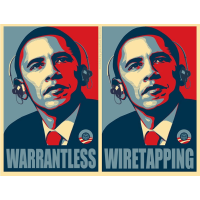Supreme Court Votes 5-4 to Reject Challenge to Warrantless Wiretap Program

Opponents of the federal government’s warrantless wiretapping program have lost their last chance to shut it down through the courts.
By a vote of 5-4, the U.S. Supreme Court rejected a legal challenge to the law that allows the National Security Agency to spy on Americans’ phone calls and emails going overseas.
Siding with the Obama administration, the court’s conservative wing said the plaintiffs—a group that included the ACLU, Amnesty International, Global Fund for Women, Global Rights, Human Rights Watch, International Criminal Defence Attorneys Association, The Nation magazine, PEN American Center, Service Employees International Union and others—could not demonstrate that they or their clients would be harmed by the law.
Writing for the majority, Justice Samuel Alito Jr. stated that the plaintiffs’ arguments were too speculative about any threat from the communications surveillance. Chief Justice John Roberts Jr. and Justices Antonin Scalia, Anthony Kennedy and Clarence Thomas joined the majority opinion.
In dissent, Justice Stephen Breyer countered that there was nothing speculative about the harm that might come. “Indeed,” he wrote, “it is as likely to take place as are most future events that common-sense inference and ordinary knowledge of human nature tell us will happen.”
Justices Ruth Bader Ginsburg, Sonia Sotomayor and Elena Kagan joined the dissent.
The law was put into place in 2008 through a Congressional amendment to the Foreign Intelligence Surveillance Act (pdf). That occurred three years after The New York Times disclosed the existence of a secret warrantless surveillance program that had been established by President George W. Bush in the wake of the September 11, 2001 terrorist attacks. President Barack Obama has been a staunch advocate of the law, and his administration defended it in court.
One legal expert said the ruling probably means the Supreme Court will never rule on the constitutionality of the law.
“Absent a radical sea change from the courts, or more likely intervention from the Congress, the coffin is slamming shut on the ability of private citizens and civil liberties groups to challenge government counterterrorism policies, with the possible exception of Guantánamo,” Stephen I. Vladeck, a law professor at American University, told The New York Times.
-Noel Brinkerhoff
To Learn More:
Justices Turn Back Challenge to Broader U.S. Eavesdropping (by Adam Liptak, New York Times)
Supreme Court Thwarts Challenge to Warrantless Surveillance (by David Kravets, Wired)
U.S. Warrantless Spying Program Survives Challenge in Supreme Court (by Barbara Leonard, Courthouse News Service)
Clapper, Director of National Intelligence, et al. v. Amnesty International USA et al. (Supreme Court of the United States) (pdf)
Unchecked Wiretapping to Continue: Obama Signs FISA Extension, Senate Votes against Oversight (by Noel Brinkerhoff, AllGov)
Obama Fights to Retain Warrantless Wiretapping (by Matt Bewig and David Wallechinsky, AllGov)
- Top Stories
- Unusual News
- Where is the Money Going?
- Controversies
- U.S. and the World
- Appointments and Resignations
- Latest News
- Musk and Trump Fire Members of Congress
- Trump Calls for Violent Street Demonstrations Against Himself
- Trump Changes Name of Republican Party
- The 2024 Election By the Numbers
- Bashar al-Assad—The Fall of a Rabid AntiSemite






Comments